Best family cars 2025

Some of the most popular cars in Britain are family hatchbacks. Household names like the Volkswagen Golf, Ford Focus and Vauxhall Astra. If you haven't owned one, the chances are you know somebody who has.
A family hatchback has to tick a lot of boxes. Five doors, because nobody likes clambering through a narrow gap behind the front seats. Enough room in the back for two or three growing children. A boot that can swallow a trolley-load of grocery bags or the luggage for holiday at the seaside. Oh, and the latest safety and connectivity technology.
To this list you can add a fuel-efficient engine, smart styling and a driving experience that will raise a smile on a country road.
No pressure, then. Fortunately, our favourite family cars tick all of these boxes and more.
Best family cars
|

Volkswagen Golf
The Volkswagen Golf is an archetypal family car. It effectively invented the sector back in the 1970s and has continued to define it ever since. This eighth-generation Golf has a new modernist new end, which some find divisive, but the fundamentals remain intact. It’s brilliantly practical, perfectly spacious and almost everything about it is straightforward and delightfully simple. The exception here is its interior controls and infotainment system, which require practice and patience. They do allow Volkswagen to pack in a lot of big-car features, though. You can get a plug-in hybrid version alongside the core petrols and diesels – and that’s before you consider the GTI and R high-performance models. Few family cars are more thrilling.
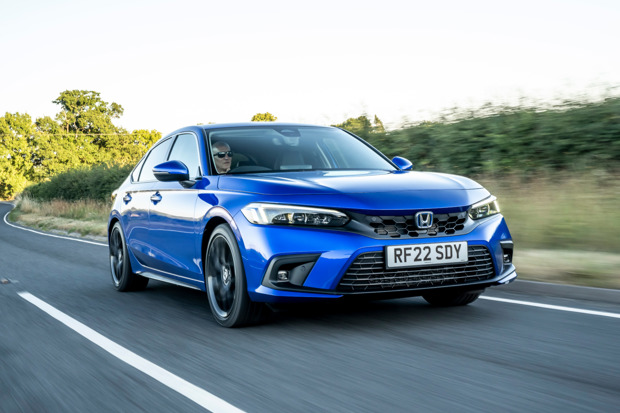
Honda Civic
The latest version of the well-established Honda Civic is one of the best yet, with an efficient 2.0-litre petrol-electric hybrid engine capable of 56.5mpg, understated looks and a really impressive driving experience. It’s spacious inside too, which means room in the back for kids, teenagers or adults. The tech to keep you informed, entertained and safe is all bang up-to-date, and the interior quality is as good as you’ll get without upping the price to something German and premium. The Civic is a car that gets all the basics spot on.
.jpg?width=620)
Skoda Octavia
The Skoda Octavia is a family car that offers space comparable to a large car. If roominess is your thing, look no further, because no car in this class offers more practicality than the Octavia. It’s large inside, for starters, with adult-friendly rear legroom and enough space across the bench seat for three. But it’s the boot that is the real standout: no less than 590 litres of space is on offer. Compare that to the 380 litres you get in a Volkswagen Golf to appreciate how vast it is. The Octavia is not a one-trick pony, however, with Volkswagen-supplied engines offering a plug-in hybrid option, along with a sporty vRS range-topper. There’s something for everyone here.
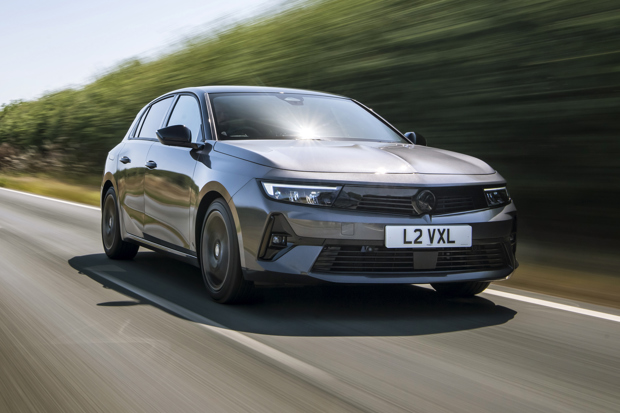
Vauxhall Astra
The latest Vauxhall Astra is an exciting new proposition in the family car sector. The previous version was worthy but dull, but this one brings radical sharp-edged styling that sets it amongst the trendiest cars in the sector. The interior has a new digital-first layout, with dual HD screens centred around the driver. Space inside is decent and Vauxhall has simplified the formerly confusing trim line-up to make buying an Astra easier. Choose from petrol, diesel, plug-in hybrid or electric options. The plug-in hybrid offers 43 miles of electric range, while the all-electric version can travel up to 258 miles on a single charge.
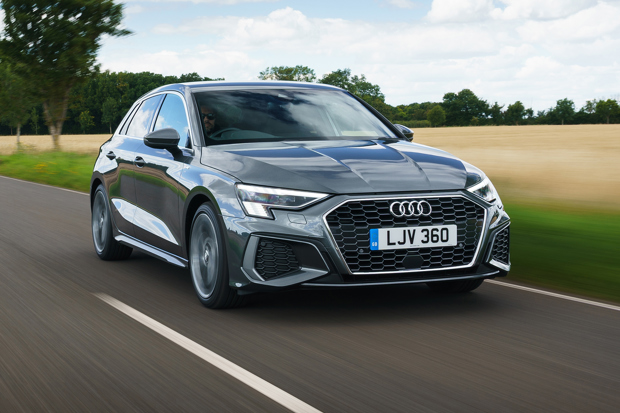
Audi A3 Sportback
The Audi A3 is offered in five-door Sportback and four-door saloon bodystyles, with pumped-up styling that nods to the original 1980s Audi Quattro. Sporty S3 and five-cylinder RS3 models steal the limelight, but the core range has some verve, too; the popular 35 TFSI petrol can do 0-62mph in 8.4 seconds and still return 50mpg. Audi’s motto of ‘Vorsprung durch Technik’ is evident in the sprawling options list, but all cars come with a decent amount of connectivity. As with other premium brands, the A3’s strong retained values help keep monthly PCP payments in check.
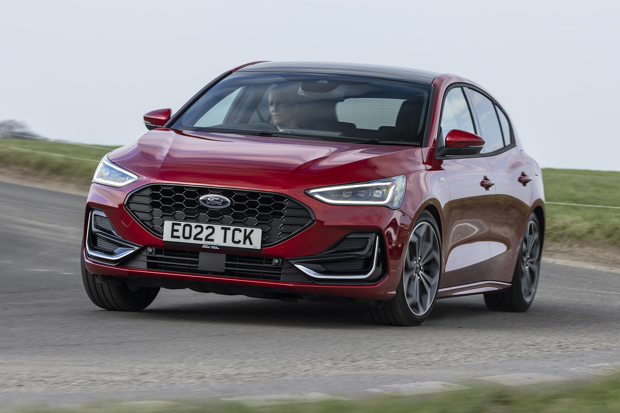
Ford Focus
Ford facelifted Focus in 2022, introducing a cleaner look for the front end, with a bigger grille and a selection of new colours. Inside, the touchscreen has grown to 13.2 inches and the function-packed Ford Sync 4 connectivity system is standard. Alongside the core 1.0-litre Ecoboost petrol engines are improved mild-hybrid motors. Ford has dropped the diesel-engined ST hot hatchback, but the 280PS 2.3-litre petrol version remains. Top nerd fact? It’s the same engine previously fitted to the Ford Mustang. For a different flavour, take a look at the Focus Active, which features SUV-inspired styling and suspension tuned for challenging surfaces and poor weather. Just the thing for Britain's pockmarked roads...
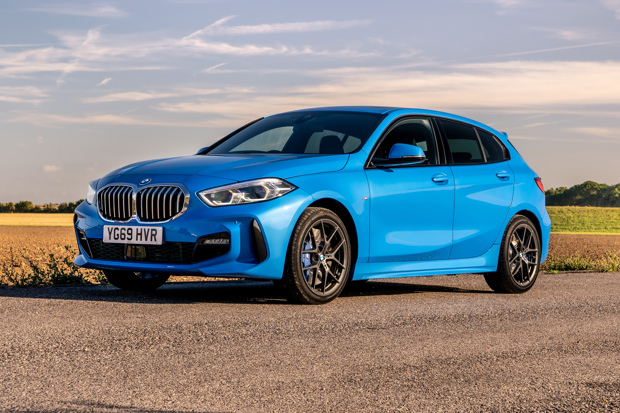
BMW 1 Series
The BMW 1 Series is an increasingly familiar sight on British streets. Now a five-door-only hatchback, it has distinctive chiselled lines and a prominent BMW kidney grille. Controversial at first, the latest looks are now finding favour. Inside, the interior has a strikingly premium feel, with the 3 Series-inspired layout looking high-tech and sophisticated. BMW infotainment systems are top-drawer and this is no exception, while the firm somehow still manages to make driving positions feel sportier than any rival. In the rear, it’s much more spacious than 1 Series models of old, and the boot is better as well. Pick from petrol, diesel, plug-in hybrid or, if you’re feeling sporty, the all-wheel-drive M135i xDrive. The latter has been joined by an equally sparkling 128ti front-wheel-drive alternative that gives the Volkswagen Golf GTI a run for its money.
.jpg?width=620)
SEAT Leon
The SEAT Leon is an award-winning family car from Volkswagen’s Spanish division. Closely related to the Golf, the latest Leon has less of an overtly sporty air than previous models. The reason? Cupra is now a standalone sporting brand, and you can choose a high-performance Cupra Leon if you wish. Most go for the regular cars, which are a good-value alternative to the Golf, with sharp-suited styling and a simpler line-up of engines, trims and options that SEAT calls ‘Easymove’. Even metallic paint is included in the price. We like FR trim, which has just the right amount of styling pizazz. Choose the good-value 1.5-litre TSI Evo petrol engine and you’ve got a great all-rounder.
.jpg?width=620)
Volkswagen ID.3
Volkswagen once made a fully electric Golf, but today it makes the ID.3. All its missing is the Golf name – it mirrors the brilliant all-round performance of the Golf with lots of choice of trim and batteries to ensure it matches different budgets. Capable of up to 347 miles between charges, it also has plenty of space inside, Isofix child-seat mounts both front and back and a reasonable size boot, too. The interior quality could be slightly better, and the infotainment system can be frustrating to use, but those are minor blots on the copybook of an excellent, all-electric family hatchback.
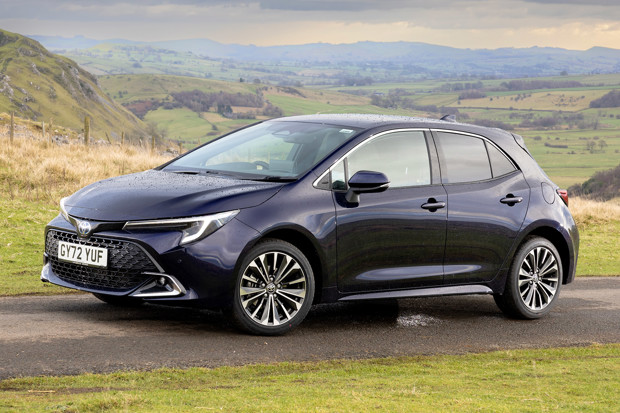
Toyota Corolla
The British-built Toyota Corolla is a top-selling hybrid that’s known as a ‘self-charging’ model. This means you don’t have to plug it in, so it’s ideal for those without a home charging point. Clever tech aims to switch the engine into EV mode wherever possible, and it’s not uncommon to see more than half a journey being driven in engine-off electric mode. There are now two engines, a 1.8-litre and the more powerful 2.0-litre. Both come with a good amount of standard equipment, including a comprehensive array of safety tech. The Corolla is almost guaranteed to be totally reliable and Toyota now underlines this with a 10-year warranty – provided you take it back to an official Toyota dealer each year for servicing.
Can you buy an electric family car?
Electric family cars are starting to arrive on the market, with the Volkswagen ID.3 and Vauxhall Astra Electric both prime examples. For now, though, most brands are offering hybrid or plug-in hybrid models. The former don’t need to be plugged in, so are ideal if you don’t have charging facilities, while the latter can travel for 30 miles or more between charges – enabling most daily drives to be tackled in pure electric mode. The petrol engine can then be saved for longer trips at the weekend.
Which is the most popular style of family car?
The most popular type of family car is the traditional five-door hatchback. Many brands used to offer three-door hatchbacks as well, but these gradually became less popular as they are not as practical. Few brands now sell them. While the SUV craze means nearly every car here has a closely-related SUV-style sibling, the core family hatch remains alive and well, with a constant presence in the UK’s best-selling cars list.
How safe are family cars?
In terms of Euro NCAP crash-test ratings, family cars score very well indeed. Of the cars that achieved a five-star rating in 2022, five were family hatchbacks, namely the Honda Civic, Skoda Octavia, Peugeot 308, Vauxhall Astra and Volkswagen Golf.
What's the most reliable, economic family car?

